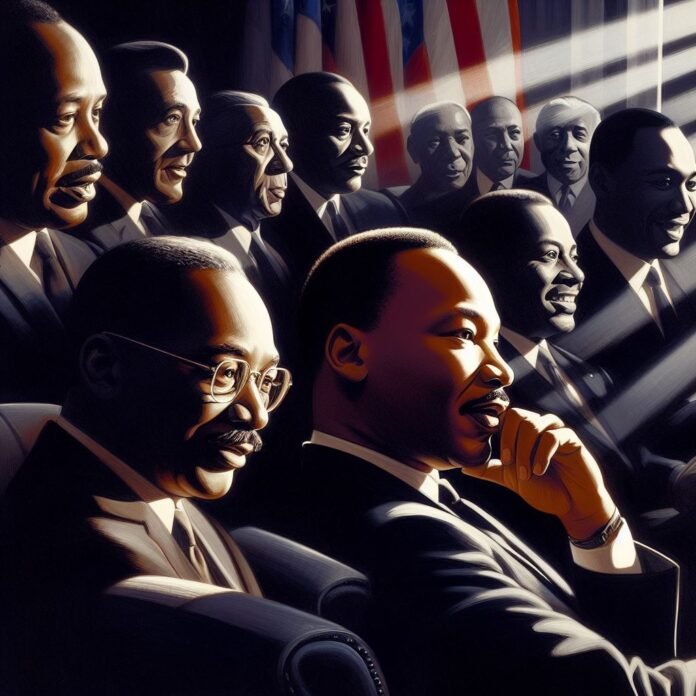In The Shadow of A Dream
Dr. Martin Luther King Jr. stands tall in the American pantheon, his image etched into history books, murals, and hearts alike. His eloquent pleas for racial equality, his unwavering commitment to nonviolence, his soaring “I Have a Dream” speech – these resonate across generations, cementing him as the face of the Civil Rights Movement. Yet, beneath the halo of adulation, a troubling shadow stretches long and dark. America, in its fascination with Dr. King, has inadvertently cast other crucial voices into the back-burner, neglecting the diverse leadership and sacrifice that fueled the movement’s triumphs.
To understand this curious dynamic, we must delve into the murky depths of America’s history with race. From its very inception, the nation bore the birthmarks of inequality. Slavery, a monstrous institution woven into the fabric of the Republic, inflicted a searing wound that festered for centuries. Even with its official abolition in 1865, its legacy cast a long shadow, morphing into the insidious tentacles of Jim Crow segregation and discrimination, effectively nullifying the promises of freedom and equality for Black Americans.
The Collective Effort of the Movement
The Civil Rights Movement was a collective effort, a chorus of voices demanding change. While Dr. King’s charismatic leadership and nonviolent approach captivated the nation, many others played crucial roles. Rosa Parks, with her quiet defiance, sparked the Montgomery Bus Boycott. Ella Baker, known as the “Fundi,” mentored emerging leaders like Diane Nash and Bernice King. John Lewis, often remembered for his bravery on the Edmund Pettus Bridge, embodied the movement’s courage and sacrifice.
However, focusing predominantly on Dr. King risks distorting the broader narrative. Such a perspective simplifies the movement into a linear, leader-centric struggle, overlooking its complexities, internal debates, and the rich spectrum of personalities that contributed to its successes. This selective remembrance glosses over the systemic nature of racism and the ongoing battles for voting rights, economic equality, and educational opportunities, perpetuating an illusion of complete progress.
The Impact of Selective Memory
This selective memory not only minimizes the roles of other activists but also sustains a narrative that overlooks the collective effort and sacrifices of many. It fosters a complacency about racial equality and obscures the enduring issues of racial disparities in healthcare, criminal justice, and economic opportunities.
Moving forward requires more than just revering Dr. King. It calls for engaging with the full, intricate story of the struggle for racial justice. Celebrating the multitude of voices that challenged the status quo, acknowledging the continuous fight against systemic racism, and recognizing it as an ongoing issue are crucial steps. Embracing this comprehensive narrative is the key to dismantling the shadows of the past and working towards a future where the ideals of equality and justice are not just aspirations but realities.
In remembering Dr. King, it’s vital to see him not just as a lone hero but as part of a larger, ongoing movement for justice. His legacy should inspire a commitment to elevate past voices, confront present challenges, and forge a future where the ideals of equality resonate universally.
For further reading and resources on this topic, please refer to the following:
- The National Civil Rights Museum
- From Black Lives Matter to Black Liberation
- National Museum of African American History and Culture
- Malcolm X
- Biography of Ella Baker
- Fannie Lou Hamer’s Biography
- The Woman Behind the Bus Boycott
Let us remember Dr. King not as a solitary figure, but as a conductor within a vast, ongoing orchestra for justice. Let his light inspire us to amplify the voices of the past, engage with the challenges of the present, and build a future where the symphony of equality resonates for all.











